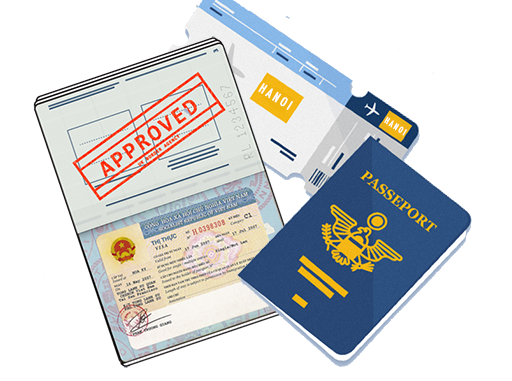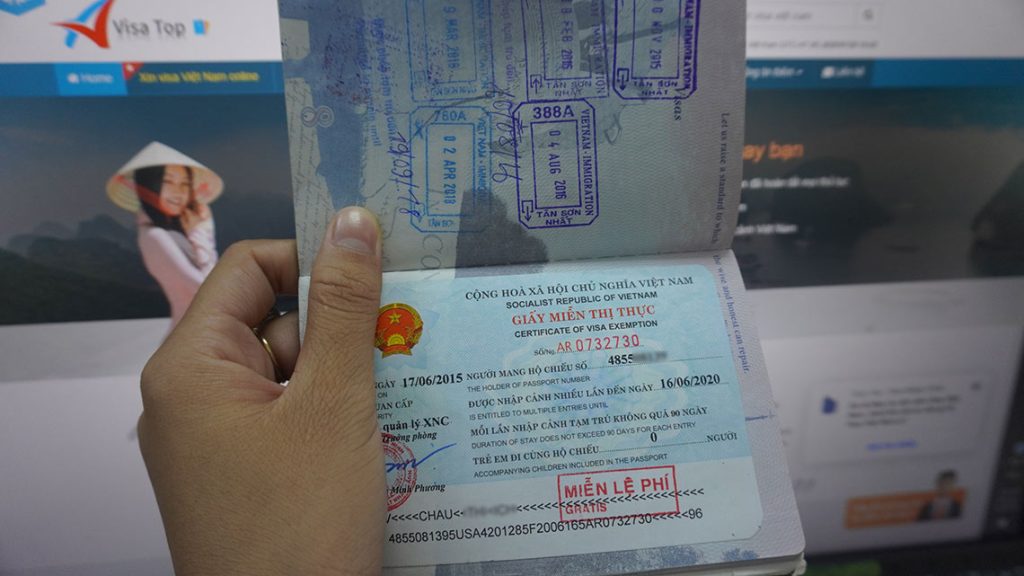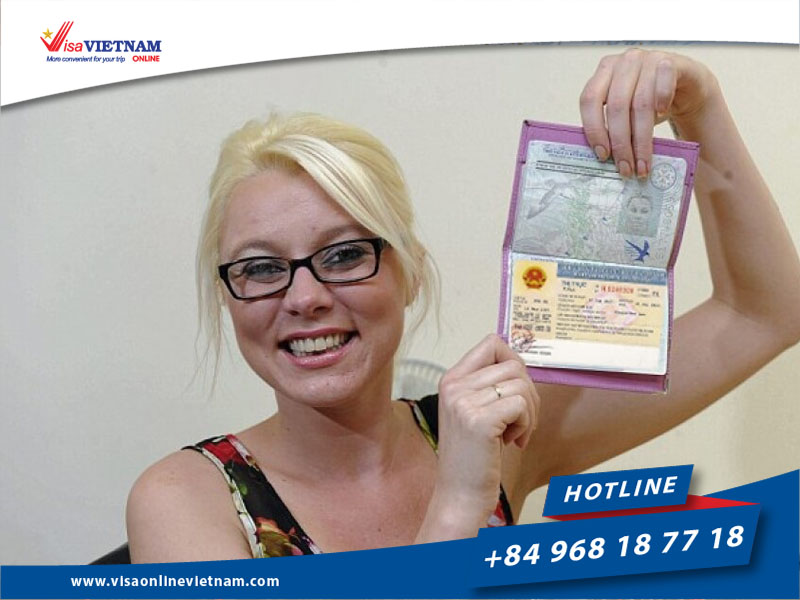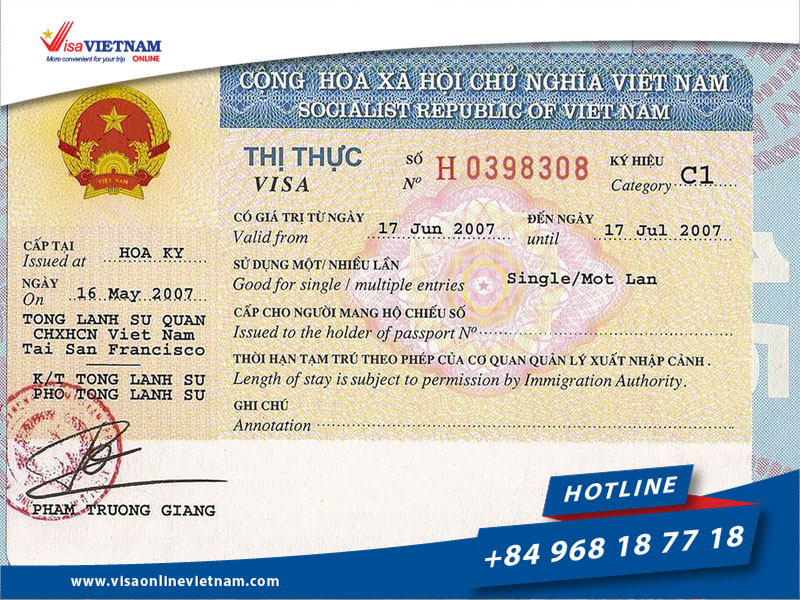
Visa Vietnam is a document that allows foreign nationals to enter and stay in Vietnam for a specific period of time. It is an essential requirement for non-Vietnamese citizens who wish to travel, work, study or conduct business in the country.
The process of obtaining a visa for Vietnam can be quite complex and time-consuming, but it is necessary for anyone who wants to visit the country. There are different types of visas available depending on the purpose of the visit, such as tourist visa, business visa, student visa, and work visa.
Visa Requirements for Vietnam

Whether or not you need a visa to enter Vietnam depends on your nationality and the length of your stay. Citizens of certain countries, including Germany, France, Italy, Spain, the UK, Russia, Japan, Republic of Korea, Denmark, Sweden, Norway, Finland, and Belarus, can now stay in Vietnam for up to 45 days without a visa. This new policy was implemented on August 15, 2023.
If you are not a citizen of one of these 13 countries, you will need to obtain a visa before entering Vietnam. There are three main ways to get a visa for Vietnam:
- E-visa: An e-visa is an electronic visa that you can apply for online. E-visas are valid for 30 days and allow for single entry. You can apply for an e-visa on the website of the Vietnam Immigration Department.
- Visa on arrival: A visa on arrival is a visa that you can obtain upon arrival at a Vietnamese airport. Visas on arrival are valid for 30 days and allow for single entry. You can apply for a visa on arrival at the visa counters at any of Vietnam’s international airports.
- Embassy visa: An embassy visa is a visa that you can apply for at the Vietnamese embassy in your home country. Embassy visas are valid for up to 90 days and allow for multiple entries.
General visa requirements:
- A valid passport with at least six months of validity remaining
- Two passport-sized photos
- A visa application form
- A visa fee
Additional requirements for certain visa types:
- Business visa: A business visa is required for foreigners who are coming to Vietnam to conduct business activities. In addition to the general visa requirements, you will also need to provide a letter of invitation from a Vietnamese company.
- Work visa: A work visa is required for foreigners who are coming to Vietnam to work. In addition to the general visa requirements, you will also need to provide a work permit from the Vietnamese Ministry of Labor.
- Student visa: A student visa is required for foreigners who are coming to Vietnam to study. In addition to the general visa requirements, you will also need to provide a letter of admission from a Vietnamese university or college.
Important notes:
- It is always best to check with the Vietnamese embassy in your home country for the most up-to-date visa requirements.
- You may need to provide additional documents depending on your nationality and the purpose of your visit.
- It is recommended that you apply for your visa well in advance of your travel date.
I hope this information is helpful. Please let me know if you have any other questions.
How to Apply for a Vietnam Visa
There are multiple methods available for applying for a Vietnam visa, each catering to different preferences and circumstances. These include applying through the Vietnamese embassy or consulate, utilizing visa-on-arrival (VOA) services, or opting for an e-visa. Let’s explore these options in detail:
- Applying through the Vietnamese embassy or consulate: This traditional method involves submitting your visa application, along with the required documents, directly to the nearest Vietnamese embassy or consulate in your home country. The application can usually be completed via mail or in person. It is advisable to initiate this process well in advance of your planned travel dates.
- Visa on Arrival (VOA) for Vietnam: VOA is a convenient option for visitors arriving in Vietnam by air. It allows you to obtain your visa upon arrival at one of Vietnam’s international airports. To use this service, you must apply online beforehand through a reputable agency authorized by the Vietnamese government. Upon arrival, you will present your pre-approved visa letter, pay the visa stamping fee, and receive your visa at the airport.
- Vietnam E-visa Application Process: Vietnam also offers e-visas, which can be applied for online and provide a more streamlined process. Visit the official Vietnamese government website or other authorized platforms to complete the application form and submit the required documents and fees electronically. Once approved, you will receive an electronic visa that can be printed and presented upon arrival in Vietnam.
Types of Visas Available for Vietnam

Vietnam offers several visa types, each serving different purposes depending on the traveler’s needs. It is essential to familiarize yourself with these options to select the correct visa category when applying. The common types of visas available for Vietnam include:
- Tourist Visa: This visa is suitable for travelers visiting Vietnam for tourism or leisure purposes. It typically allows stays of up to 30 days, but extensions are possible.
- Business Visa: If you plan to visit Vietnam for business-related activities such as attending conferences, meetings, or exploring business opportunities, a business visa is required. It generally permits longer stays than tourist visas.
- Student Visa: Students enrolled in educational institutions in Vietnam need a student visa. This visa type varies depending on the duration of study and may require additional documentation from the educational institution.
- Work Visa: Foreign nationals seeking employment in Vietnam must obtain a work visa. This usually involves securing employment before arriving in the country and going through the necessary steps to obtain a work permit issued by the Vietnamese authorities.
- Diplomatic/Official Visa: Diplomats and government officials traveling to Vietnam for official purposes should apply for a diplomatic or official visa through the appropriate channels.
- Transit Visa: If you have a short layover in Vietnam while traveling to another destination and do not plan to leave the airport, you may be eligible for a transit visa. This visa allows a temporary stay in Vietnam during your transit period.
It is important to note that specific requirements, fees, and permitted durations vary for each visa type. Always refer to the official Vietnamese government resources or consult with your local embassy/consulate for accurate and up-to-date information.
Vietnam Visa Fees and Processing Time

The fees associated with obtaining a Vietnam visa depend on various factors, including the visa type, processing method, duration of stay, and nationality. Here are some key points to consider:
- Visa Application Fees: When applying through an embassy or consulate, there is typically a non-refundable fee imposed for processing your visa application. The amount varies depending on the visa type and the embassy/consulate where you submit your application.
- Visa Stamping Fees (VOA): If you opt for a visa on arrival, you will need to pay the visa stamping fee upon arrival at the airport. This fee also varies depending on the visa type and is usually payable in cash (in USD or Vietnamese Dong).
- E-visa Fees: E-visas involve paying an application processing fee online. The fee amount varies based on the visa type and is typically lower than embassy/consulate application fees.
- ProcessingTime: The processing time for Vietnam visas can vary depending on the method chosen and the visa type. It is advisable to apply well in advance of your intended travel dates to allow for any unexpected delays. Here are some general guidelines:
- Embassy/Consulate Visa: The processing time for embassy/consulate visas can range from a few days to a couple of weeks, depending on the workload and specific requirements of the embassy or consulate where you apply.
- Visa on Arrival (VOA): VOA services generally provide faster processing times, often within 2-3 business days. However, it is recommended to apply online and receive the pre-approved visa letter before traveling to avoid any potential issues upon arrival.
- E-visa: E-visas typically have shorter processing times compared to embassy/consulate visas. In most cases, you can expect to receive your e-visa within 3-5 business days after submitting your application online.
Remember that these processing times are approximate and subject to change. It is always best to check the official sources or consult with authorized visa agencies for the most accurate and up-to-date information regarding fees and processing times.
Documents Required for a Vietnam Visa
When applying for a Vietnam visa, certain documents are typically required to support your application. While the specific requirements may vary depending on the visa type, here is a list of common documents you may need:
- Passport: Your passport must be valid for at least six months beyond your planned departure date from Vietnam. It should also have at least one blank page for the visa stamp.
- Visa Application Form: Fill out the visa application form accurately and completely. You can usually obtain this form from the Vietnamese embassy/consulate or download it from their official website.
- Passport-sized Photos: Prepare two recent passport-sized photos that meet the specifications outlined by the Vietnamese authorities. The dimensions and other requirements may vary, so ensure you comply with the guidelines provided.
- Travel Itinerary: Provide a detailed travel itinerary, including flight reservations, hotel bookings, and an outline of your planned activities in Vietnam. This demonstrates your purpose of visit and intended duration of stay.
- Proof of Sufficient Funds: Show evidence of sufficient financial means to support your stay in Vietnam. This can be in the form of bank statements, credit card statements, or any other proof of financial stability.
- Supporting Documents: Depending on the visa type, additional documents may be required. For example, for a business visa, you may need an invitation letter from a Vietnamese company, while a student visa might require a letter of acceptance from the educational institution.
It is crucial to prepare all the necessary documents according to the specific requirements of your chosen visa category. Failing to provide the correct documentation may result in delays or even rejection of your visa application.
Vietnam Visa Extension and Renewal
In certain cases, you may wish to extend or renew your visa while staying in Vietnam. Here are some essential points to consider regarding visa extensions and renewal:
- Visa Extension: If you have a valid visa and want to extend your stay in Vietnam beyond the permitted duration, you have the option to apply for a visa extension. This process must be initiated before your current visa expires. Contact the Vietnam Immigration Department or a local travel agency specializing in visa services for guidance on the extension procedure, required documents, and fees.
- Visa Renewal: If you plan to exit Vietnam and return at a later date, you can choose to renew your visa instead of extending it. The renewal process involves obtaining a new visa, either by applying through an embassy/consulate or utilizing VOA or e-visa services. The requirements and fees for visa renewal are similar to those of obtaining a new visa.
It is important to note that visa extensions and renewals are subject to specific conditions and limitations. They may not be possible for all visa types or in every circumstance. Consult with the relevant authorities or seek advice from visa agencies to ensure you comply with the regulations and procedures.
Visa-Free Travel to Vietnam
Vietnam also allows visa-free travel for citizens of certain countries. Visitors from these countries can enter Vietnam without a visa for a specified duration. However, it is essential to note the following points:
- Duration of Stay: The duration of visa-free stays varies depending on the country of citizenship. It can range from 14 days to 90 days. Ensure you check the exact permitted duration for your specific nationality.
- Entry Requirements: While visa-free entry is allowed, there are still requirements you must meet. These may include having a valid passport, proof of onward travel, and sufficient funds to support your stay.
- Extension or Conversion: If you plan to stay in Vietnam for longer than the visa-free period or engage in activities that require a visa (such as work or study), you will need to apply for an appropriate visa before continuing:
the visa-free period expires. It is important to be aware of these limitations and take appropriate action if needed.
Some examples of countries whose citizens enjoy visa-free travel to Vietnam, along with the permitted duration of stay, include:
- United Kingdom: Citizens of the United Kingdom can stay in Vietnam visa-free for up to 15 days.
- France: French citizens can also enjoy a visa-free stay of up to 15 days in Vietnam.
- Germany: Citizens of Germany are permitted a visa-free stay of up to 15 days in Vietnam.
- Japan: Japanese citizens can enter Vietnam without a visa and stay for up to 15 days.
- South Korea: Citizens of South Korea can visit Vietnam without a visa for a maximum of 15 days.
It is crucial to note that visa-free travel regulations can change over time, so it is advisable to check the latest information from official sources or consult with the Vietnamese embassy/consulate in your home country.
Q&As for Visa Vietnam from Korea
Q: Do South Korean citizens need a visa to enter Vietnam?
A: As of 2023, South Korean citizens do not need a visa to enter Vietnam for a stay of up to 45 days. However, certain conditions must be met:
- Your passport must be valid for at least six months beyond the arrival date in Vietnam.
- Your passport must have at least two blank pages for the visa stamp.
Q: How long can South Korean citizens stay in Vietnam without a visa?
A: South Korean citizens can stay in Vietnam for up to 45 days without a visa.
Q: What if I want to stay in Vietnam for longer than 45 days?
A: If you want to stay in Vietnam for longer than 45 days, you will need to apply for a visa. There are two options for applying for a visa:
- eVisa: An eVisa is an electronic visa that can be obtained online. This is the easiest and most convenient option for most travelers. To apply for an eVisa, you will need to provide a copy of your passport, a photograph, and a credit card. The processing time for an eVisa is typically 3-5 business days.
- Visa on arrival: A visa on arrival can be obtained at the airport upon arrival in Vietnam. This option is more expensive than an eVisa, and it can also take longer to process. To apply for a visa on arrival, you will need to provide a copy of your passport, a photograph, and the visa fee.
Q: Where can I apply for a Vietnam visa?
A: You can apply for a Vietnam visa online, at the Vietnam embassy or consulate in your country, or at the airport upon arrival in Vietnam.
Q: How long does it take to process a Vietnam visa?
A: The processing time for a Vietnam visa depends on the type of visa you apply for. The processing time for an eVisa is typically 3-5 business days. The processing time for a visa on arrival is typically 1-2 hours.
Q: How much does a Vietnam visa cost?
A: The cost of a Vietnam visa depends on the type of visa you apply for and the length of your stay. The fee for an eVisa is typically US$25. The fee for a visa on arrival is typically US$40.
Conclusion
Obtaining a visa for Vietnam is an essential step for most travelers planning to visit this beautiful country. By understanding the visa requirements, application processes, fees, and other pertinent details covered in this article, you can better plan your trip and ensure a smooth visa application experience.
Remember to familiarize yourself with the specific visa type that suits your purpose of travel, gather all the required documents, and consider the most suitable method for applying based on your circumstances. Whether you choose to apply through an embassy/consulate, utilize visa-on-arrival services, or opt for an e-visa, be mindful of the processing times and fees associated with each option.
Additionally, it is vital to adhere to the laws and regulations regarding visa extensions, renewals, and visa-free travel in Vietnam. If you have any uncertainties or require further clarification, reach out to the appropriate authorities or seek assistance from authorized visa agencies.
By staying informed and prepared, you can ensure a smooth and hassle-free process when obtaining your Vietnam visa, allowing you to focus on enjoying all the wonders this captivating country has to offer.

Hey am Jagdeep Singh so I need e visa so kindly help me 01040630220
For this month
I need e visa so please help me what process 01040630220